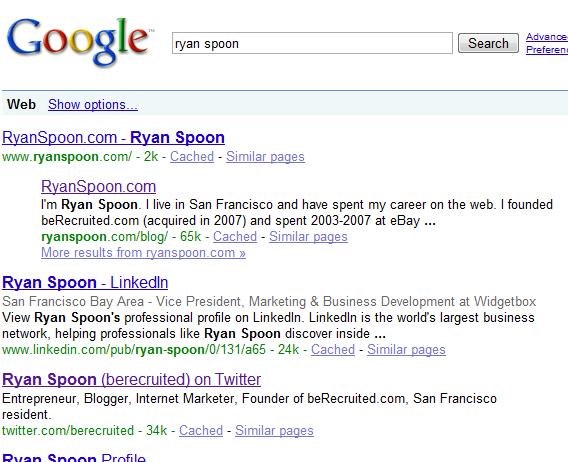Facebook's vanity URL push (covered by TechCrunch) is a big deal for two reasons:- the direct business model opportunity - traffic via natural search
Let's leave the business model alone for the now as it is unclear whether Facebook plans to tie a business model to vanity URLs (whether or not they choose to do so - users would certainly be willing to pay subscriptions for the ability to brand themselves on the web's most popular social hub). Let's also assume that, regardless of whether Facebook implements a direct revenue model, there will be indirect benefits particularly from brands and advertisers who will continue to build their on-Facebook activity (branding, advertising, content, etc).
The most direct benefit of vanity URLs, however, is traffic via natural search. Facebook is the web's largest network and its most active social / content hub. In a people search, Facebook should by all accounts appear as either the first or second result (for most individuals). Yet they typically don't... Google "Ryan Spoon" and you get:
#1. RyanSpoon.com (should be #1) #2. LinkedIn (good content, but static) #3. Twitter (my account ID is berecruited ... so the optimization isn't even there) #4. CrunchBase (wow... that is high) #5. 5Spoons.com (another personal site of mine) #6. Mobile Twitter (fascinating this is so high) #7. Facebook (other than RyanSpoon.com - this is where I contribute most of my content) #8. Techmeme (an article of mine)

An optimized vanity URL should almost immediately move Facebook into the #2 result. As hot as Twitter is, Facebook is more than 10x in size and activity. Currently, Twitter sees about 10% of its visits arrive from Google. With some liberal math:
- 20m monthly visitors (Compete) - ~200m monthly visits (Quantcast) - 10% visits from Google (Compete) - 20m monthly visits from Google
Assume that 50% of those visits are derivatives of Twitter's brand name (generous) and you have 10m monthly visits from Google.
According to Quantcast, Facebook sees about four billion monthly visits - which is about 20x Twitter. This gives you a sense of what improvement in Google's rankings could mean for Facebook - which currently, according to Compete, sees 7.9% of its visits from Google. If Facebook reaches reaches the 10% mark, the above match would mean that Facebook would realize an incremental 84m visits from Google. Of course, it could be argued that Facebook could / should move beyond the 10% mark (particularly if they surpass Twitter and LinkedIn and others in SEO).... and those numbers get very big very quickly (15% would be ~275m incremental visits).
Whether the business model around vanity URLs is direct or indirect - the Facebook model is predicated on users and activity... both of which benefit significantly.
